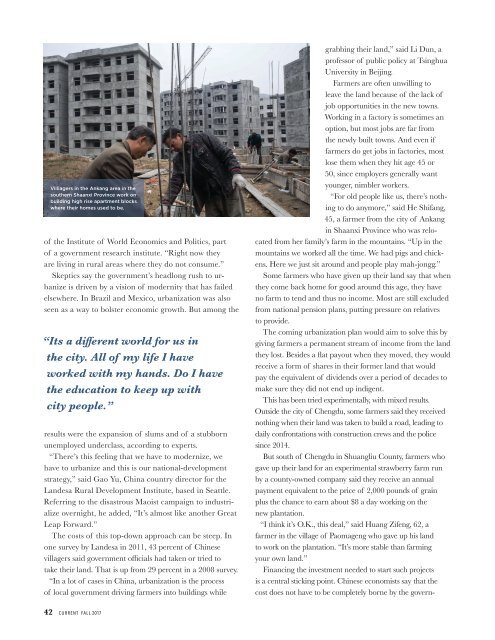Current Magazine
You also want an ePaper? Increase the reach of your titles
YUMPU automatically turns print PDFs into web optimized ePapers that Google loves.
of the Institute of World Economics and Politics, part<br />
of a government research institute. “Right now they<br />
are living in rural areas where they do not consume.”<br />
Skeptics say the government’s headlong rush to urbanize<br />
is driven by a vision of modernity that has failed<br />
elsewhere. In Brazil and Mexico, urbanization was also<br />
seen as a way to bolster economic growth. But among the<br />
“Its a different world for us in<br />
the city. All of my life I have<br />
worked with my hands. Do I have<br />
the education to keep up with<br />
city people.”<br />
results were the expansion of slums and of a stubborn<br />
unemployed underclass, according to experts.<br />
“There’s this feeling that we have to modernize, we<br />
have to urbanize and this is our national-development<br />
strategy,” said Gao Yu, China country director for the<br />
Landesa Rural Development Institute, based in Seattle.<br />
Referring to the disastrous Maoist campaign to industrialize<br />
overnight, he added, “It’s almost like another Great<br />
Leap Forward.”<br />
The costs of this top-down approach can be steep. In<br />
one survey by Landesa in 2011, 43 percent of Chinese<br />
villagers said government officials had taken or tried to<br />
take their land. That is up from 29 percent in a 2008 survey.<br />
“In a lot of cases in China, urbanization is the process<br />
of local government driving farmers into buildings while<br />
grabbing their land,” said Li Dun, a<br />
professor of public policy at Tsinghua<br />
University in Beijing.<br />
Farmers are often unwilling to<br />
leave the land because of the lack of<br />
job opportunities in the new towns.<br />
Working in a factory is sometimes an<br />
option, but most jobs are far from<br />
the newly built towns. And even if<br />
farmers do get jobs in factories, most<br />
lose them when they hit age 45 or<br />
50, since employers generally want<br />
younger, nimbler workers.<br />
“For old people like us, there’s nothing<br />
to do anymore,” said He Shifang,<br />
45, a farmer from the city of Ankang<br />
in Shaanxi Province who was relocated<br />
from her family’s farm in the mountains. “Up in the<br />
mountains we worked all the time. We had pigs and chickens.<br />
Here we just sit around and people play mah-jongg.”<br />
Some farmers who have given up their land say that when<br />
they come back home for good around this age, they have<br />
no farm to tend and thus no income. Most are still excluded<br />
from national pension plans, putting pressure on relatives<br />
to provide.<br />
The coming urbanization plan would aim to solve this by<br />
giving farmers a permanent stream of income from the land<br />
they lost. Besides a flat payout when they moved, they would<br />
receive a form of shares in their former land that would<br />
pay the equivalent of dividends over a period of decades to<br />
make sure they did not end up indigent.<br />
This has been tried experimentally, with mixed results.<br />
Outside the city of Chengdu, some farmers said they received<br />
nothing when their land was taken to build a road, leading to<br />
daily confrontations with construction crews and the police<br />
since 2014.<br />
But south of Chengdu in Shuangliu County, farmers who<br />
gave up their land for an experimental strawberry farm run<br />
by a county-owned company said they receive an annual<br />
payment equivalent to the price of 2,000 pounds of grain<br />
plus the chance to earn about $8 a day working on the<br />
new plantation.<br />
“I think it’s O.K., this deal,” said Huang Zifeng, 62, a<br />
farmer in the village of Paomageng who gave up his land<br />
to work on the plantation. “It’s more stable than farming<br />
your own land.”<br />
Financing the investment needed to start such projects<br />
is a central sticking point. Chinese economists say that the<br />
cost does not have to be completely borne by the govern-<br />
42 CURRENT FALL 2017





